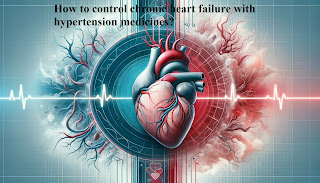How to control chronic heart failure with hypertension medicines?
Do you know? Hypertension for a long period of time can promote left ventricular hypertrophy (thickening of the left ventricular wall), which leads to heart failure. It is important to control high blood pressure to prevent cardiac-related risks like heart failure. Today, we are going to discuss the strategies and medications that reduce the risk of hypertension-related heart failure.
What is the relation between hypertension and chronic heart failure?
Heart Failure is a condition in which the heart does not pump enough blood to the body, which leads to insufficiency of oxygen. This can be caused by high blood pressure, which does not show any symptoms in the body. It makes the heart muscle thick (left ventricular hypertrophy) and stiff by increasing the workload and risk of the heart. Hypertension not only affects the heart but also affects the kidney and brain.
Strategies for Success: Integrative Management of Hypertension in Chronic Heart Failure
Medical Adherence
Drugs like β-blockers, angiotensin-converting enzyme inhibitors, angiotensin receptor blockers, aldosterone receptor blockers, hydralazine, and nitrates are effective in chronic heart failure and also have an antihypertensive effect on patients.
1. Angiotensin-converting enzyme inhibitors (ACE inhibitors): Your doctor may often prescribe an antihypertensive medication, ACE inhibitors, and beta blockers as first-line treatment options. Drugs like angiotensin-converting enzyme inhibitors (ACE inhibitors) can help relax the blood vessels to decrease blood pressure, improve blood flow, and decrease the strain on the heart.
Examples: Concor 5mg Tablet is a beta1-selective adrenoceptor-blocking agent that affects the body's response to certain nerve impulses, especially in the heart. It works by decreasing the heart rate and making it easier for the heart to flow blood throughout the body. As a result, it reduces blood pressure and the risk of having a stroke, a heart attack, other heart problems, or kidney problems.
2. β-blockers:
Beta-blockers or beta-adrenergic blocking agents, help in decline the blood pressure by blocking the epinephrine hormone (adrenaline) effect, involved in increasing the heart rate and blood pressure.
3. Aldosterone receptor blockers:
Aldosterone receptor antagonists help to block the aldosterone effect, which results in the prevention of sodium reabsorption and encourages water loss. This helps in reducing the blood pressure and the fluid around the heart.
4. Hydralazine
Hydralazine is a direct vasodilator used to treat hypertension in patients. However, it is not the first line of treatment for hypertension. In heart failure, the drug increased cardiac output and stroke volume and decreased vascular resistance in pulmonary and systemic venous pressure.
5. Nitrates
Nitrates have hemodynamic effects, which help to decrease the left ventricular filling pressure and vascular resistance and improve cardiac output. It can be used along with hydralazine.
Tips To follow!
Blood Pressure Monitoring:
You may be advised to monitor your blood pressure regularly, which helps to reduce the risk of hypertension-related heart failure.
Lifestyle Modifications:
You may be advised to eat a healthy diet that contains low sodium, saturated fats, and cholesterol levels and is rich in fruits and vegetables. It is advised to avoid or limit your alcohol intake and quit smoking to maintain a healthy heart.
Regular Exercise:
Regular physical activities can help improve heart function and aid in lowering blood pressure. You can do walking (outside or on a treadmill), stationary cycling, swimming, and rowing or water aerobics.
Stress Management:
Practice stress-reduction techniques, like meditation or yoga, can help in managing stress, which can impact both heart failure and hypertension.
Conclusion:
Chronic heart failure can be prevented by maintaining normal blood pressure, as it is the common risk factor that increases the risk of heart failure in individuals. It is recommended to speak with your doctor if you have high blood pressure and get the proper treatment plans to reduce the risk of heart failure.



Comments
Post a Comment